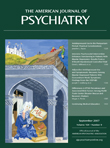Nonresponse to Treatment for Depression Following Myocardial Infarction: Association With Subsequent Cardiac Events
Abstract
Objective: Depression following myocardial infarction is associated with an increased risk of cardiac events, but attempts to alter cardiovascular prognosis by providing antidepressive treatment have not been successful. This may be because of the limited effects of antidepressive treatment on depression itself. The authors assessed whether nonresponse to treatment of post-myocardial infarction depression is associated with new cardiac events. Method: The authors made a subgroup analysis of a multicenter randomized, clinical trial on the effects of antidepressant treatment for post-myocardial infarction depression. Patients were enrolled in double-blind, placebo-controlled treatment with mirtazapine (30 mg/day) and, in the case of insufficient treatment response after 8 weeks, open treatment with citalopram. Patients were classified as responders to antidepressants (at least 50% reduction in Hamilton Depression Rating scale [HAM-D] score or HAM-D score <9 at 24 weeks) (N=43) or as nonresponders (N=27) and compared to untreated control subjects (N=98) on cardiac events (cardiac mortality or cardiac-related hospital admission) after 24 weeks post-random assignment and within 18 months after index infarction. Results: The event rate was 25.6% among nonresponders, 11.2% among untreated control subjects, and 7.4% among responders. In relation to untreated comparison subjects, nonresponders had a hazard ratio of 2.66 for new cardiovascular events, which remained after the authors controlled for potential confounders (hazard ratio=2.92). Conclusions: This study provides further preliminary evidence that nonresponse to treatment of post-myocardial infarction depression may be associated with cardiac events. Efforts should be dedicated to developing more effective treatments for depressed patients with myocardial infarction.



